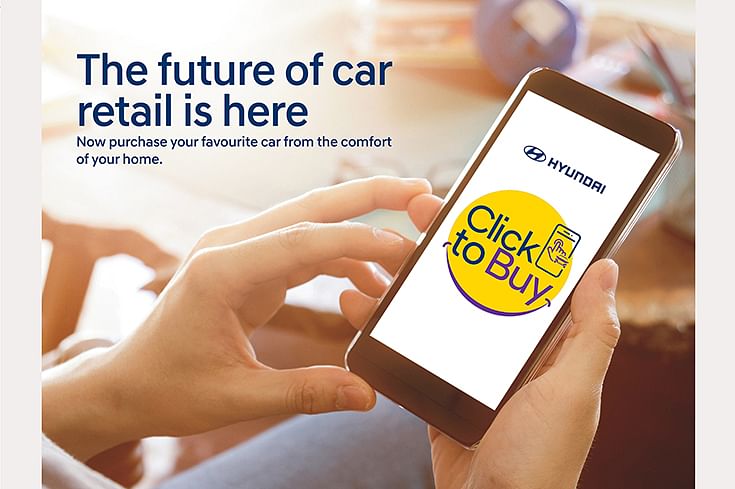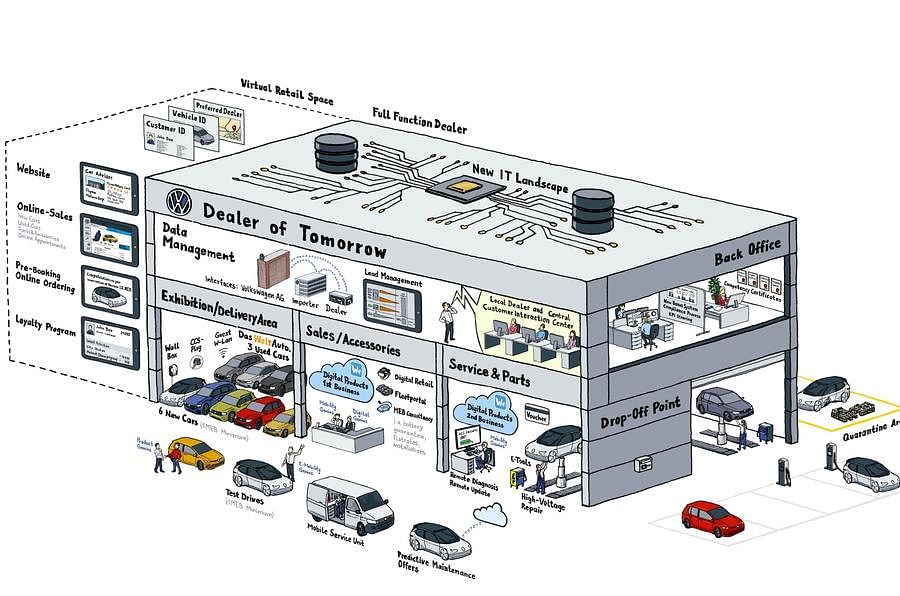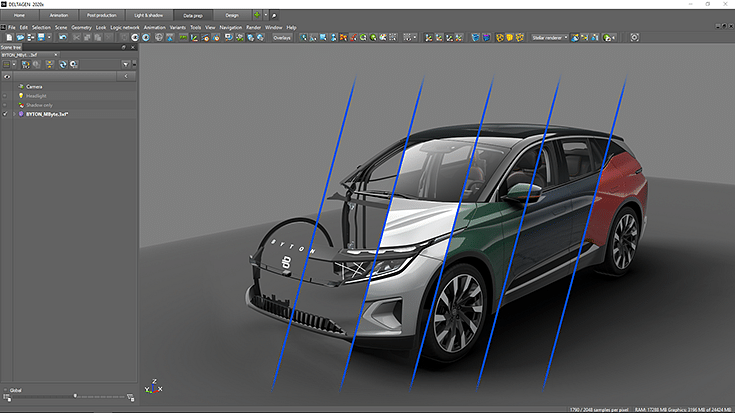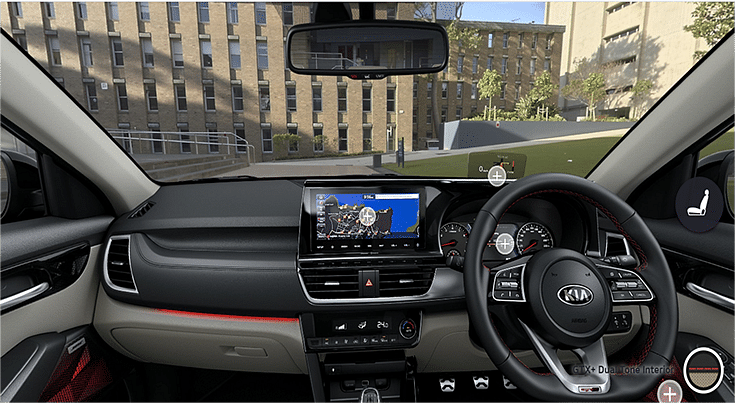Will online car sales and digital platforms dominate post-Covid era of retail?
In a time of coronavirus and beyond, the car buying experience will likely see a dynamic change with customers preferring the Internet to walk-ins.
Even as 2020 has entered into its fourth month, few car makers or their dealers would have envisioned at the start of the year the massive change that would envelope them. With the world and the automotive industry, along with virtually all sectors of business, laid low by the coronavirus pandemic, it can be surmised that, going forward, the car buying experuence will change dyncamically.
In the new world of 'social distancing', vehicle manufacturers and their dealers, sitting on expensive real estate, will have to rethink their retail strategies as customers will prefer to click-and-order as against visiting a brick-and-mortar showroom. More and more dealers will have to activate e-commerce capabilities, train their staffers in going paperless and ensure that the customer continues to be pampered, albeit in a different manner: remotely. Other than the actual test drive, at the customer's house or office, the dealer will have to rejig several operations. From facilitating vehicle pick-up and drop service through to over-the-air software updates, to predictive maintenance apps, customers will benefit from a wide variety of tailor-made offerings.
So, what will be the ‘new normal’? For India Auto Inc, which contributes 7.1 percent to the country’s GDP through the manufacture and sale of new vehicles, and thrives on customer walk-ins into showrooms, test drives, in-person negotiations and ceremonious vehicle deliveries, the concept of social distancing might just compel a new way of vehicle retail which hasn’t been explored in all its seriousness so far – retail through digital platforms.
So, for a population that is otherwise increasingly getting used to the concepts of shared mobility, e-commerce and making digital payments in the recent past, can buying vehicles online become the new trend?
Digital first?
According to a recent KPMG study, ‘digital will be a real push’ in a post-Covid world which will emerge out of the tectonic shift in our social behaviour after exercising a prolonged bout of social distancing, the underlying fear of getting infected till the time a vaccine comes out, notwithstanding.
So, will this lead OEMs to finally switch to online retail? While it has been seen in the past to some extent, the lack of a serious push and the huge concern about the sustainability of the existing brick-and-mortar dealerships selling vehicles and generating significant employment did become key hindrances.
But, as things stand, two of India’s mainstream passenger vehicle OEMs – Hyundai Motor India and Tata Motors – have recently rolled out their digital retail platforms, fully geared up to aid customers buy new vehicles in this atmosphere where personal safety and hygiene is absolutely crucial.
A click that might stick
The move from Hyundai Motor India in the form of its ‘Click to Buy’ platform comes at an absolutely critical juncture when people would be sceptical of even stepping into showrooms once the countrywide lockdown starts getting released in major cities.

While Hyundai says that the online platform will be an additional channel for its dealers across the country, it could be expected that it might just be the norm going forward. Hyundai allows a customer to take a quotation from the dealer, get financing, customise the vehicle and finally place the order right from the website.
Meanwhile, at present, Tata Motors allows booking of a new car through its website and allocates a particular dealer based on the pin code of the customer. The remaining processes still need to be undertaken offline between the customer and the dealer representative, but the customer can avail a home delivery of the new car.
Similarly, in the passenger vehicle segment, there are other OEMs like Maruti Suzuki India which also offer booking of a car or an appointment with a dealer online, while also allowing a customer to customise a new car right from the comfort of their homes.
As for MG Motor India, the recent entrant into the Indian market could be seen leveraging the power of technology to optimise costs by offering an immersive, real-life experience to customers at its all-digital showroom in Bangalore.
By the use of a mix of augmented reality and interactive technologies, the new digital showroom can showcase the brand’s products to customers without the need of a show car on display, thus, saving on real estate. The 3D platform tools for MG have been supplied by a tech company named Eccentric Engine.

Volkswagen is one global carmaker which is already well placed to handle the change of retail mindset. As far back as in October 2018, the German carmaker had unveiled a plan to digitalise its sales model in Europe and make its dealers future-ready. The aim, slated to have been ready this month (April 2020) is to provide seamless individual round-the-clock support for customers going far beyond vehicle sales on the basis of a unique Volkswagen customer ID.
According to Rajan Wadhera, president, Society of Indian Automobile Manufacturers (SIAM), “Social distancing is going to be inevitable for a safe and sustainable work culture. A much higher transformation is going to happen across value chain – the digital transformation which saw resistance from everyone, is likely to make a headway; a lot of the vehicles will be sold digitally, and across all kinds of product categories and countries we will be working towards bringing the costs down and increasing margins.”
Surge in personal vehicle buying after lockdown, shared mobility to be hit
If initial studies from China are to be referred, a spurt in personal vehicle usage is expected in the coming months owing to the higher risk of getting infected by the Coronavirus during travel in public or shared transportation. According to an IPSOS report, as many as 72 percent respondents out of a pool of 601 people who don’t own a personal vehicle at the moment in China have made up a firm decision about buying a new vehicle as the country resumes normalcy.
“All these data points are positive indicators for the auto industry that sales are going to increase as safety will be on top of one’s mind and therefore, a shift will be there in the mindset to use a personal vehicle,” says Gajendra Jangid, co-founder and CMO of Cars24, a tech-enabled used-car platform.
While India might face its own challenges in terms of people’s ability to immediately buy a new vehicle in the aftermath of a deep economic impact caused by the prevalent lock-down, a lot of the customers as well as OEMs may follow suit and interact with their customers online.
According to Dassault Systemes’ Michael Laxman, “As far as behaviour is concerned, the Coronavirus-induced lock-down has impacted everybody, so definitely there are going to be changes in the way people approach a lot of things, not just buying vehicles.”
“For OEMs, it has always been about marketing and sales. Now, it’s going to be a combined effort of a lot of stakeholders, who would devise new means of marketing and retail to counter the change in consumer behaviour. Having said that, the concept of change, in particular, is not new. People have been buying vehicles online. A lot of research is already done in this regard which clearly shows that the behaviour has been shifted long ago,” added the brand leader for the French technology giant’s 3DEXCITE suite.
According to Jangid, “Given the scenario, OEMs themselves would want online sales of cars rather than consumer coming to their franchise dealerships.”
“That’s where start-ups like ours will have an edge and advantage as our technology is already robust and it gives us efficiency and scale. Our system is already in place to carry out retail online,” he adds.
Virtually achieving near-reality
With deep penetration of the Internet across the length and breadth of India, the consumer has become empowered and now conducts a significant part of the pre-buying research online before finally heading out to showrooms to have a closer look-and-feel of the product.
According to Laxman, “The actual physicality is important for a prospective customer. We have to work with new ideas and innovative solutions. There’s a lot of work that goes in. As far as the look-and-feel and the online user experience are concerned, that is where Dassault Systemes’ 3DEXCITE suite comes in.”

Dassault Systemes’ 3DEXCITE suite has helped create the look-and-feel and the online user experience for the Byton brand.
“First, we build a digital continuity for which we take 100 percent verified parts of a product, for instance a motorcycle, and take that exact data and information, and enhance it with our solution. The exact material information, for instance, the use of chrome on the mirror or the side panels, is applied on this heavily-engineered CAD data. Then, there are photographic solutions such as shooting images, lighting and use of RAW image files which have been superimposed in different environments. These pictures can then be taken and be deployed to print on billboards, magazines, or even product brochures,” he adds.

Potential buyers of the popular Seltos SUV can get a virtual reality experience of the vehicle on the Kia Motors India website.
“One could also make CGI films without even having to do a proper physical video shoot of the car or the motorcycle. This can then be plugged into the product’s website, which works on the cloud,” explains Laxman.
Role of dealers in an online world
Now, if the current scenario really pushes vehicle manufacturers to shift a significant portion of their retail online, what will be the future of dealers? Would OEMs emulate a Tesla model wherein every step of buying a new vehicle right from booking to the payment is conducted online, while the customer can go to a company-owned Tesla delivery outlet and bring a new vehicle home?
Ather Energy – the electric two-wheeler start-up – has already successfully implemented this model in Bangalore and is planning on a nation-wide rollout soon.
“The dealer is still going to be very important and be the face of the company to its customers,” tells Laxman.
“As technology converges, people will be able to book, finance and negotiate with the dealer based on the database information fed in the system. There might be a new player in the market who could just be the sole dealer for the OEM and do the stocking and delivery. It’s not something that dealers are not going to be profitable out of or not be a part of this system altogether.”
“Moreover, a dealer can never stock all variants of a product. The real estate is a problem and online is going to make everything easy and transparent. Also, a customer’s transaction with a relationship manager is always one-time until the next purchase. Man-less showrooms are going to be popular concepts in the future, and these are concepts that are being discussed by OEMs for a long time now,” Laxman explains.
According to Jangid, “We are gearing up and as the government release the lock-down, we are gearing up to try and make sure that we are available to customers. We are working with our partners to help them reduce the inventory overload by so that they will be able to buy fresh cars from us and get things back to normalcy.”
“We are leveraging the advantage of our high monthly active users on our website to aid our dealer get better traction for their inventory. While as of now, we don’t have any bail-out package planned for our dealers, as most of them are unorganised players, we do have the provision of working-capital financing and we have been doing this from last two years based on the cars they purchase from us.
“Once the situation gets normalised, we will keep on funding our channel partners. Unlike new car dealers these players don’t have benefits from banks or NBFCs and that makes us help them out to raise working capital from us at a far lower interest rate than getting from any unorganised finance providers,” Jangid gives a status of the current situation of used car dealers in the market.
So, while it is really hard to ascertain the actual impact of the Coronavirus on our lives and how it changes some of the vital activities we’ve been used to so far, it is indeed a great opportunity for the automobile sector to redefine itself and emerge as an enabler by adopting futuristic and advanced channels of connecting with its customers.
READ MORE
Mercedes-Benz India launches 'Merc from Home' digital retail campaign
BMW India thinks digital first for customer buying experience
Volkswagen's all-India sales and service network goes digital
RELATED ARTICLES
Beyond Cars: VinFast's Full-spectrum EV Push in India
With $2 billion committed, VinFast is constructing an integrated play spanning cars, scooters, buses, ride-hailing and c...
A Breather for Hero
A combination of policy tailwinds, new products and Honda’s cautious approach on EVs put a stop to the constant encroach...
Renault India's Quiet Fixer
As the head of Renault India, Francisco Hidalgo Marques faces his biggest challenge yet.






 11 Apr 2020
11 Apr 2020
 22112 Views
22112 Views
















 Kiran Murali
Kiran Murali




